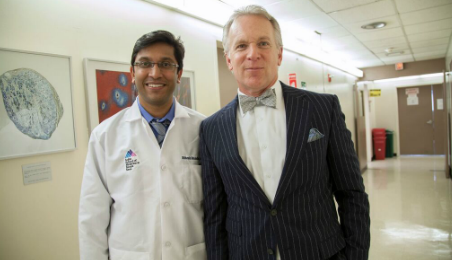A Gifted Athlete Experiences the Early Signs of Parkinson’s Disease
Drew Heighway Was 49-Years-Old When He Was Diagnosed With Parkinson’s Disease
Born and raised in Canada, Drew was a gifted athlete. As a young adult, he began to participate in triathlons and continued to excel. Then something happened.
 “In 1998, while out for a run on the west side of Manhattan, I cramped up so badly I could barely get back to my apartment,” Drew recalls. “A couple of weeks later, I was diagnosed with Parkinson’s disease (PD).”
“In 1998, while out for a run on the west side of Manhattan, I cramped up so badly I could barely get back to my apartment,” Drew recalls. “A couple of weeks later, I was diagnosed with Parkinson’s disease (PD).”
Drew was experiencing typical early symptoms of PD: a stiff shoulder, diminished gait, and painful muscle cramps in his foot. The main motor (movement) symptoms of PD include tremor, stiffness, slowness, and balance problems, caused primarily by the death of dopamine-producing neurons in the brain. As the years progressed, so did Drew’s PD symptoms and the number of drugs prescribed to treat them.
The Side Effects of Parkinson’s Disease Medications Can Be Disabling, Especially to an Athlete
The drugs used to treat PD mimic the action of dopamine in the brain, but the medication does not affect the progression of the disease, only the symptoms. The therapeutic effect of the drugs often diminishes over time, making treatment for some patients unreliable. Side effects of medications can also be quite disabling.
This is exactly what happened to Drew. “I started to experience fainting spells after beginning one of the PD medications,” he says. “I passed out on a number of occasions. The worst was on a very busy commuter train going into Manhattan.”
Making the Decision to Undergo Deep Brain Stimulation Surgery for Parkinson’s Disease at Mount Sinai
At about that time, Drew began to consider a non-drug treatment for PD called deep brain stimulation (DBS) surgery. “This was a difficult decision, not only for me but for my family as well,” he says. “I felt the medication was taking a toll on me and it absolutely impaired some of the decisions I made. Mood swings were top of the list. I was not an easy person to live with.”
DBS involves implanting one or two micro-electrodes in the brain, where the symptoms of PD are generated. The exact area of implantation is carefully determined before the surgery via sophisticated imaging techniques. Once in place, the electrodes are connected via a lead tunneled under the skin to a generator device implanted in the chest wall. After careful programming, the generator delivers electrical current via the implanted electrode and suppresses the movement disorders associated with PD.
In 2014 after investigating neurosurgeons at four of the nation’s leading hospitals, Drew decided to have his DBS surgery done at The Mount Sinai Hospital.
“I made the decision to go forward with Dr. Brian Kopell in April of 2014, after my wife and I met with him for the first time,” says Drew. “His confidence was infectious! We knew right away he would be the one to operate on me.” Brian Kopell, MD, is the Director of the Center for Neuromodulation at Mount Sinai.
Ritesh Ramdhani, MD, a neurologist and movement disorder specialist in the Robert and John M. Bendheim Parkinson and Movement Disorders Center at Mount Sinai, met with Drew and his wife prior to his DBS surgery.
“Thankfully, my wife is an absolute sponge when gathering information, so we were armed with a number of questions going into our initial consultation,” Drew recalls. “Dr. Ramdhani answered all of our questions. Plus, Dr. Ramdhani was extremely forthcoming with expectations associated to the programing procedure for both my wife and me.”
It Takes a Village: A Team Approach to DBS Surgery Yields a Successful Outcome
Drew’s DBS surgery was performed by Dr. Kopell in July 2014. Dr. Ramdhani continues to work as part of Drew’s team, optimizing his quality of life by making exacting adjustments to his DBS system and medication regimen.
When asked about the success of his surgery, Drew says, “I feel like I’m back in sync, not only with myself but with my family. I have noticed an increase in my well-being since the programming began, and it continues to get better each month.”
Raising Awareness of Parkinson’s and Making a Difference: Focus on What’s in Front of You!
Drew’s dedication to PD awareness is an important part of his journey. His son Jamie and his friends created Bikes Battle Parkinsons (BBP) to raise money on behalf of the Michael J. Fox Foundation. During one excursion, they rode 680 miles – around Lake Ontario in five days, from Toronto to New York in five days, and from Montreal to Boston in four days. In September 2013, Drew and Jamie rode the Swiss Alps, riding nearly 20 miles up the Klausen Pass mountain range. In June 2015, Drew and other BBP members plan to participate in the Mont-Tremblant 70.3 Half Ironman Triathlon.
Drew remains focused on living his motto: “Focus on what’s in front of you and do whatever it takes to make a difference. Be a positive influence!”